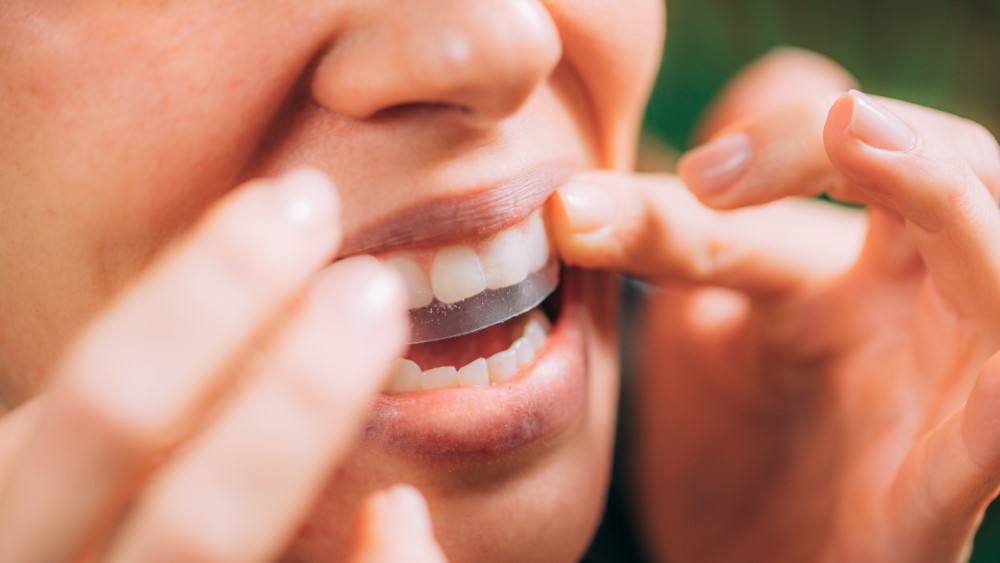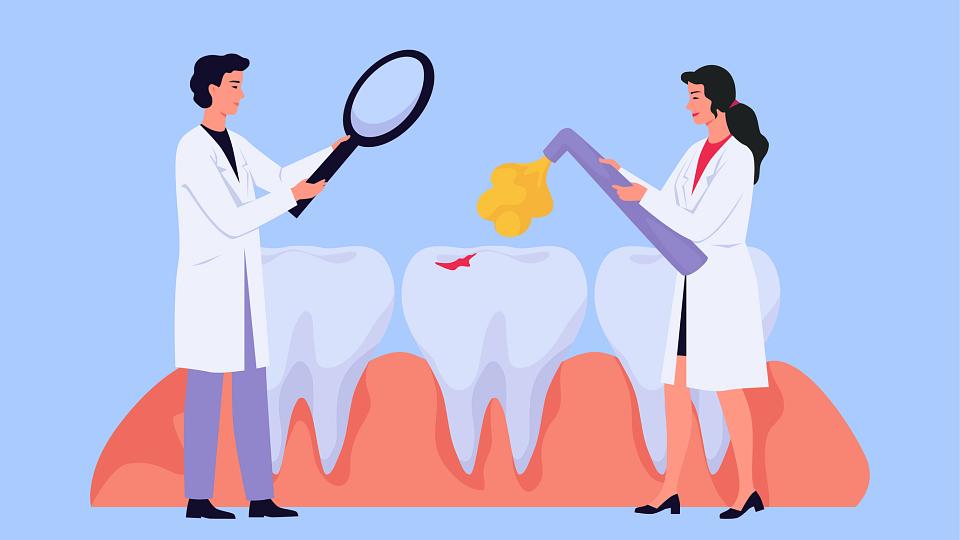
Interviewer: You're interested in using an over-the-counter teeth whitening kit, but you want to be sure that it's safe and, more importantly, effective. What do you need to know to decide what teeth whitening options are best for you? Dr. Arman Farhadtouski specializes in dentistry at University of Utah Health.
Effectiveness of OTC Teeth Whitening Kits
So my first question, Dr. Farhadtouski, is do those teeth whitening kits you buy in the store and take home actually work?
Dr. Farhadtouski: To give you a simple answer, yes. But there are some key distinctions that we should clarify. It depends on what the active ingredient is in this over-the-counter. There are two types, two versions of peroxide, hydrogen peroxide, and carbamide peroxide, that are used for whitening. And they are effective. They do work. So if the whitening kit you're using lists that product, you can rest assured that it will be effective.
Are OTC Teeth Whitening Kits Safe?
Interviewer: Okay. It'll be effective. And are they safe?
Dr. Farhadtouski: If you use the product as per the manufacturer's recommendations and you're using them appropriately and for the duration of time that is recommended, then yes, they are safe for your teeth.
Interviewer: Okay. Are there any particular patients that shouldn't use an over-the-counter teeth whitening kit and maybe they should talk to their dentist first? Or pretty much anybody that wants to use it, as long as you use it according to directions, you're going to be fine.
Dr. Farhadtouski: So, yes, and I think the most important takeaway point from this discussion that we could have is that regardless of what the dental treatment is that you're considering undergoing, even those that you can do at home, it's always important for you to discuss it with the appropriate dental professional and make sure that they're explaining this to you in a manner which you fully understand.
So for example, what do I mean by that? If you are trying to do whitening, for example, at home and you have a situation where you're like, "Okay, I don't like this. I'm going to just take the initiative and I'm just going to use my at-home or over-the-counter whitening and try it." You try it and nothing happens and nothing happens and nothing happens, and you're like, "Why is this not working?"
That could be a situation where if you had that discussion with the appropriate healthcare professional, they could help you understand, broadly speaking, the different types of staining that can take place on each tooth that may contribute to the aesthetics of it, and whether or not whitening is appropriate for your specific concern, if it's going to address it.
And let's get into that a little bit to help educate our folks who are listening so they can also have some background information. So, broadly speaking, there are two categories of staining on teeth. You have intrinsic staining, staining that is inside of the tooth, and you have extrinsic staining, staining that is outside of the tooth.
Intrinsic staining can be caused by a lot of factors, such as using certain medications while the individual's mother is pregnant or during gestation. You can have white spots from fluorosis. You can have darkening of the tooth from trauma, for example, or other developmental anomalies. Whitening will not affect intrinsic staining. So regardless of the concentration of the product or how long you use it, you will not find the answer you're looking for. Whereas extrinsic staining, they are helped by whitening.
It's very important for us to be able to help you determine what kind of staining you have and make an appropriate recommendation after that. That's where really discussing what your concerns are with the appropriate healthcare professional can be very impactful.
Professional vs. At-Home Teeth Whitening
Interviewer: Are over-the-counter kits as effective as what I could get at some dental offices? I know some dental offices do offer teeth whitening.
Dr. Farhadtouski: Yes, absolutely. So, yes, they are as effective. The active ingredient in the over-the-counter whitening kits that you can buy is one of the two active ingredients that we talked about. And it's the same ingredient that we use in a dental office when we're doing a professional cleaning.
The only difference that you will notice is the concentration of the active ingredient. And the concentration just affects how rapidly you can get to that endpoint that you're trying to get to.
So if you notice, if you purchase an over-the-counter kit, it may take several weeks for you to get to where you've got to, whereas, with professional cleaning, you can get to that in one dental office visit.
Interviewer: Oh, wow. Okay.
Dr. Farhadtouski: But there are pros and cons with everything, and if I had the option, I would actually recommend my patients start slower. And the reason for that is the main common side effect of whitening is sensitivity, and that sensitivity for most folks will resolve. But the faster we make that transition and the higher concentration of the active ingredients we use, the more likely you are to experience that sensitivity.
That's why I recommend that folks, if they do use the at-home kits, take it slower, work with those smaller concentrations, and go from there.
Interviewer: All right. Yeah, because if we're doing some teeth whitening, we probably want them white as fast as we can, but taking some time sounds like a good idea because it could cut down on that sensitivity side effect.
When I do use an at-home kit, how long should I expect the results that I see after I've used it a few times to last without using it? Or is this something I'm going to be using kind of for the rest of my life if I want to keep that level of whiteness?
Dr. Farhadtouski: A little bit of both. So is it permanent? No. And it helps to understand why staining can happen. Staining can be the result of stubborn plaque that has kind of attached and adhered to the tooth, and that plaque sometimes has certain compounds that produce color. What our peroxide products are doing is they are affecting and breaking down the bonds in these chemicals that create color. And so they aren't able to do their job, which is to make color.
Now, over time, these bonds re-form and that's where you notice that the brightness that you had noticed has dimmed a little bit. And so that is something that you may have to do consistently if you're trying to maintain it.
But I also think that proper oral hygiene as well as routine dental cleanings should automatically be a part of your routine to make sure that what you're trying to address isn't actually more appropriately addressed through other means.
At-Home Teeth Whitening Results and Maintenance
Interviewer: Got it. And then when I use the teeth whitening kits, how white can I expect my teeth to get?
Dr. Farhadtouski: That's hard. That is very difficult for me to say because each individual is going to be a little different. Our teeth naturally have a yellow shade and a yellow hue, and for some individuals that yellowness is a little bit more prominent, and for some individuals, it's a little less prominent.
Also, our inner tooth layer one layer below the enamel, the dentin, also has a yellow color. So if we have some folks where the enamel is a little thinner or not as pronounced, that yellowing can also show through, but we cannot correct that through whitening.
So I think it's difficult to say, "Yes, you will notice X percentage brightness if you use this for this long." But if you use it appropriately and you're actually trying to address extrinsic staining and it's after your cleaning and you have good proper oral hygiene, you should see some degree of brightness.
How to Determine If OTC Teeth Whitening Kits Are Right for You
Interviewer: So my conclusion after our conversation is over-the-counter teeth whitening kits are effective, and they can be safe if used appropriately according to the instructions, and they do work.
Dr. Farhadtouski: If tooth whitening is something that you are considering, I would ask you to keep certain factors in mind. First and foremost, there are unique patient factors and there are unique health factors that may make an individual not a suitable candidate for whitening.
So it's very important to have that discussion and have a thorough explanation to your oral health provider of your medical history because that may determine whether or not you can proceed with this treatment.
Interviewer: Oh, whether it's effective or whether it's safe?
Patient Safety, Oral Health, and Caution with Online Trends When Considering At-Home Teeth Whitening
Dr. Farhadtouski: Exactly. It's more a question of safety. So, for me, patient safety should always be paramount. That's the first one.
The second thing is we also have to make sure that the mouth is healthy and we have a stable oral environment. I think as a dentist I may be doing a disservice to you if I whiten your teeth, but you have a mouthful of cavities than if I address the cavities and then we discuss things that are more elective. And so I highly recommend that patients have healthy mouths before considering this.
Lastly, there are instances where the staining, the discoloration, or the aesthetic concerns that the patient has may not necessarily be due to the natural tooth, but an existing restoration that's in an area that they can see.
Restorations, especially our conventional filling material, can stain over time, especially if the individual is more likely to consume darker fluids, such as wine, coffee, or tea, or if they are a smoker, or if maybe the shade of the material was more appropriate because it was done so long ago.
So that can also be something that contributes to dissatisfaction with the aesthetics of a patient's smile, and tooth whitening products do not make your previous fillings brighter.
Interviewer: Anything that you want to throw at the end here for somebody who's made it through this whole conversation? What would their takeaway be?
Dr. Farhadtouski: Honestly, I would say, again, please, please, please take the time and discuss any treatment that you are considering with a healthcare provider prior to initiating that treatment.
Make sure that you are up to date on your oral health checkups, on cleanings, and that you have a stable oral environment before moving forward with this.
And really make sure that the problems that you have can even be addressed by these over-the-counter whitening products.
The last thing I will say, because it is so much more prevalent now, is I would say to the folks who have taken the time to hang out with us and listen to this to please be wary of online trends and at-home whitening things.
There are a lot of videos that talk about either using certain fruits or certain foods that may make your teeth appear whiter. And that's actually a very temporary thing. They're actually utilizing the acidic properties of the foods to dehydrate your teeth, which makes them appear brighter for a very short period of time.
But that whitening is not long-lasting, and from our previous discussion regarding how foods can change the oral environment, having an acidic environment constantly is actually much more harmful to the long-term health of your teeth.
How to Access Affordable Dental Care
Dental health is crucial, but not always affordable for all budgets. James Bekker, DMD, from University of Utah School of Dentistry, offers an insider's guide to finding and utilizing low-cost dental services.
Understanding Tooth Sensitivity and How to Manage It
Feeling discomfort when eating hot or cold foods? Tooth sensitivity can be more than just a minor annoyance—it could signal a deeper issue. David Okano, MD, breaks down what different...






